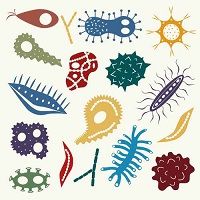Article
IBD: Different Microbes Cause Different Symptoms
Author(s):
Some microbes are more associated with specific irritable bowel disease symptoms than others, researchers reporting at the American College of Gastroenterology Scientic Meeting reported.

The role of the intestinal microbiota in irritable bowel disease (IBD) appears to be significant. In a study presented today at the American College of Gastroenterology Scientific Meeting in Honolulu, researchers reported on preliminary work looking at how different microbes cause different symptoms in IBD.
Yehuda Ringel, MD of the University of North Carolina (UNC) at Chapel Hill and colleagues there and at other institutions determined which microbes were present in patients with IBD versus controls.
Subjects were recruited from the Chapel Hill general population and UNC outpatient clinics by advertising. All the patients with IBD had mild to moderate symptoms. All also had had a normal colonoscopy with the last 3 years and has consistent reporting of a symptom on a two-week run-in period.
Patients not allowed to participate in the study included those who had taken antibiotics or probiotics within a six-week period prior to the start of the study, as well as those with diseases and other conditions that would skew the results. There were 83 patients with IBD and 24 controls, matched for age (mean 36 years) sex (80% female) and ethnicity (77% Caucasian). Stool was collected every morning and analyzed.
The study showed several bacterial groups caused more pain and had a negative effect on quality of life.
Three bacterial groups explained 23% of the variance in stool frequency: Clostridium ramosum, Prevotella melaninogenica, and Papillibacter cinnamivorans. Five bacterial groups explained 33% of variation in stool consistency: Clostridium leptum, Papillibacter cinnamivorans, Akkermansia, Faecalibacterium prausnitzii, and Clostridium stercorarium.
Three bacteria were associated with 53.3% of the variations in pain as measured by rectal balloon distensions: Clostridium orbiscindens, Anaerotruncus colihomiis, and Anaerovorax odorimutans.
The findings call for more research, but suggest “a complex multifactorial role for the intestinal microbiota in IBS.” Yehuda said further studies are planned.




